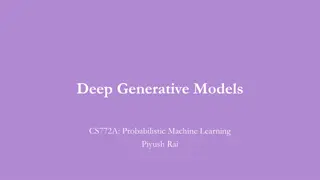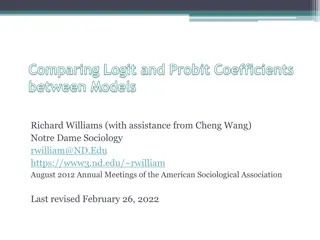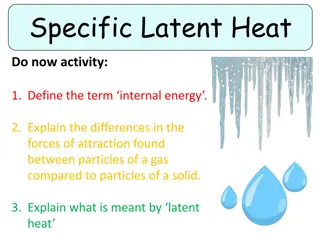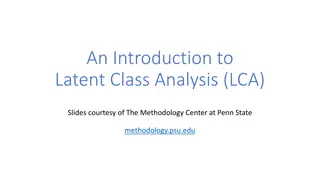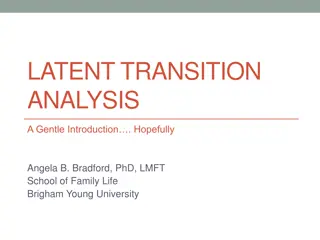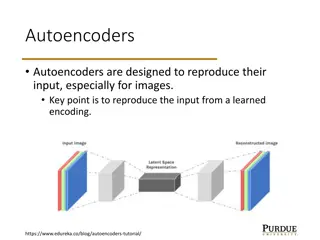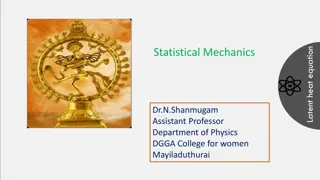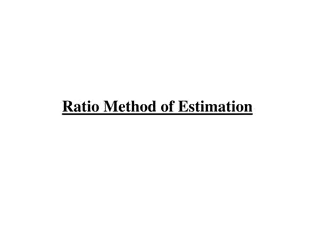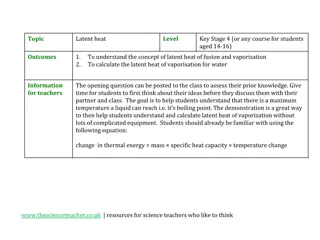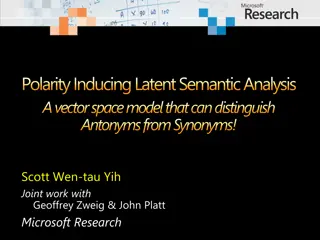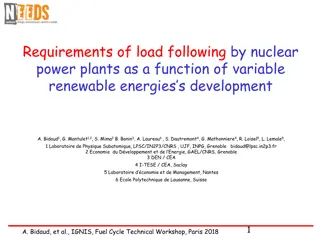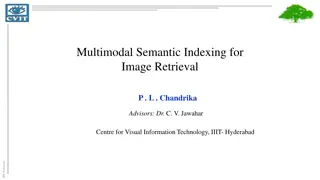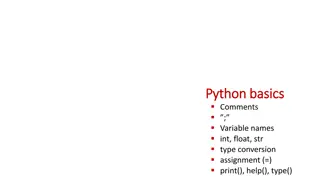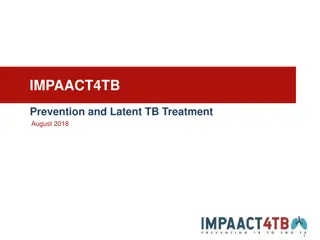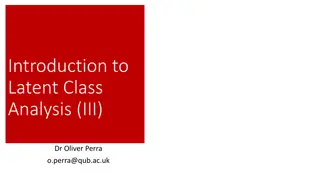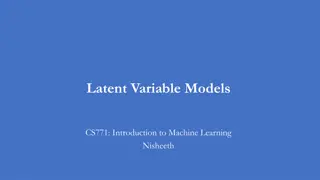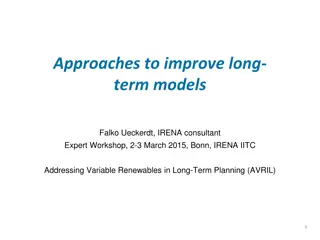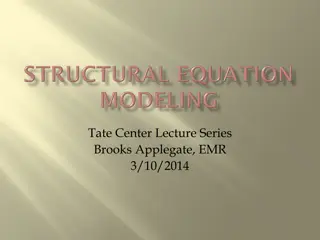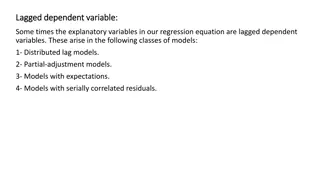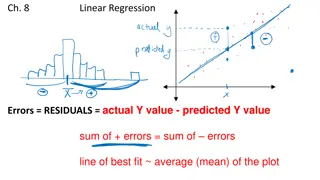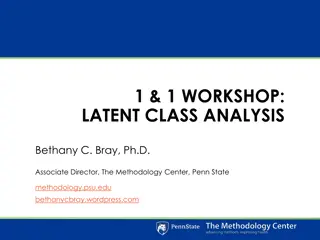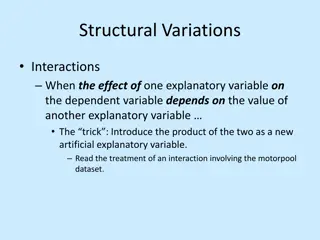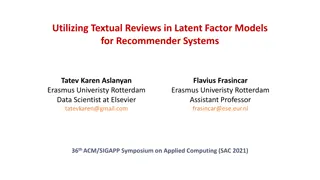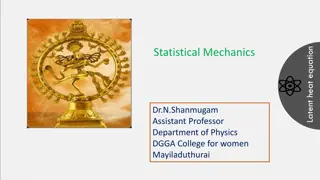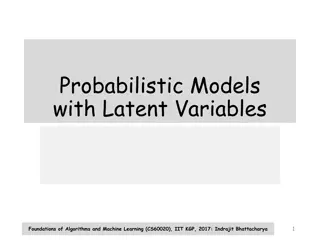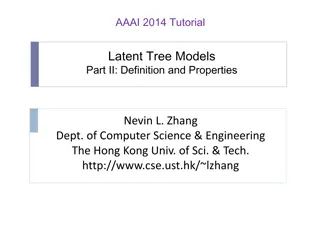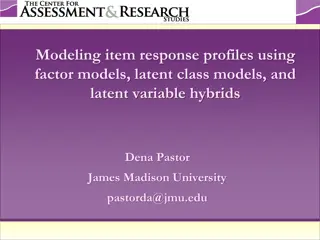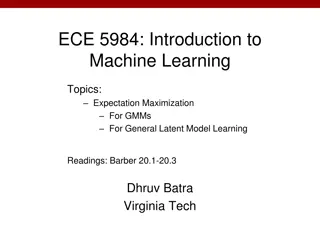System Models in Software Engineering: A Comprehensive Overview
System models play a crucial role in software engineering, aiding in understanding system functionality and communicating with customers. They include context models, behavioural models, data models, object models, and more, each offering unique perspectives on the system. Different types of system
6 views • 33 slides
Deep Generative Models in Probabilistic Machine Learning
This content explores various deep generative models such as Variational Autoencoders and Generative Adversarial Networks used in Probabilistic Machine Learning. It discusses the construction of generative models using neural networks and Gaussian processes, with a focus on techniques like VAEs and
10 views • 18 slides
The Concept of Return to Factor in Production Economics
Return to Factor is a key concept in production economics that explains the relationship between variable inputs like labor and total production output. The concept is based on the three stages of production - increasing returns, diminishing returns, and negative returns. By analyzing the behavior o
0 views • 7 slides
Comparing Logit and Probit Coefficients between Models
Richard Williams, with assistance from Cheng Wang, discusses the comparison of logit and probit coefficients in regression models. The essence of estimating models with continuous independent variables is explored, emphasizing the impact of adding explanatory variables on explained and residual vari
1 views • 43 slides
Specific Latent Heat and Particle Changes
Internal energy, forces of attraction in gases vs. solids, and latent heat concepts are explained. Particles changing state are visualized through a graph. Self-assessment points and the calculation for specific latent heat of fusion are discussed. The rearrangement of the equation for specific late
2 views • 20 slides
Latent Class Analysis (LCA)
Latent Class Analysis (LCA) is a powerful statistical method for identifying subgroups within a population based on unobservable constructs. This method helps in addressing various research questions and can be applied to different types of data. Learn about the basic ideas, models, and applications
2 views • 33 slides
Latent Transition Analysis: A Comprehensive Overview
Latent Transition Analysis (LTA) is a statistical method that identifies unobservable groups within a population using observed variables, aiding in profiling individuals and tracking transitions over time. It is particularly useful for modeling categorical constructs, informing prevention and inter
0 views • 23 slides
Latent Print Development Techniques
Latent prints, hidden impressions left behind by sweat pores on surfaces, can be developed using physical and chemical methods. Factors affecting latent prints include surface type, movement during contact, handling, and environmental conditions. Various surfaces require specific development techniq
0 views • 29 slides
Variational Autoencoders (VAE) in Machine Learning
Autoencoders are neural networks designed to reproduce their input, with Variational Autoencoders (VAE) adding a probabilistic aspect to the encoding and decoding process. VAE makes use of encoder and decoder models that work together to learn probabilistic distributions for latent variables, enabli
8 views • 11 slides
Marginal Costing in Cost Accounting
Marginal Costing is a cost analysis technique that helps management control costs and make informed decisions. It involves dividing total costs into fixed and variable components, with fixed costs remaining constant and variable costs changing per unit of output. In Marginal Costing, only variable c
1 views • 7 slides
Phase Transformations and Latent Heat Equation in Statistical Mechanics
In this informative piece by Dr. N. Shanmugam, Assistant Professor at DGGA College for Women, Mayiladuthurai, the concept of phase transformations in substances as they change states with temperature variations is explored. The latent heat equation is discussed along with definitions of fusion, vapo
3 views • 22 slides
Ratio Method of Estimation in Statistics
The Ratio Method of Estimation in statistics involves using supplementary information related to the variable under study to improve the efficiency of estimators. This method uses a benchmark variable or auxiliary variable to create ratio estimators, which can provide more precise estimates of popul
2 views • 30 slides
Latent Heat of Vaporisation through Demonstration
Students will learn about latent heat of fusion and vaporisation, specifically focusing on calculating the latent heat of vaporisation for water. Through a hands-on demonstration, students will understand the concept that a liquid cannot exceed its boiling point temperature, as energy is used to bre
0 views • 4 slides
Unveiling Polarity with Polarity-Inducing Latent Semantic Analysis
Polarity-Inducing Latent Semantic Analysis (PILSA) introduces a novel vector space model that distinguishes antonyms from synonyms. By encoding polarity information, synonyms cluster closely while antonyms are positioned at opposite ends of a unit sphere. Existing models struggle with finer distinct
1 views • 29 slides
Load Following by Nuclear Power Plants in Relation to Variable Renewable Energies' Development
The study explores the requirements of load following by nuclear power plants in the context of variable renewable energies' growth. It discusses the impact of renewable energy development on nuclear economic models and the need for dispatchable capacities. Benchmarks are set to test robustness of d
0 views • 11 slides
Multimodal Semantic Indexing for Image Retrieval at IIIT Hyderabad
This research delves into multimodal semantic indexing methods for image retrieval, focusing on extending Latent Semantic Indexing (LSI) and probabilistic LSI to a multi-modal setting. Contributions include the refinement of graph models and partitioning algorithms to enhance image retrieval from tr
1 views • 28 slides
Python Basics: Comments, Variable Names, Assignments, and More
Learn about the basics of Python programming, including the use of comments to explain code, defining variable names, type conversion, assignment operators, and general guidelines for coding practices. Explore how to effectively use comments to describe code functionality and understand the signific
2 views • 21 slides
Latent TB Infection and its Implications
Latent TB infection serves as a reservoir for active TB disease, posing a significant global health burden, especially among high-risk populations such as people living with HIV and household contacts of TB patients. With 1.7 billion people estimated to be infected with LTBI globally, targeted inter
1 views • 57 slides
Composite Models in Building Complex Systems
Composite models are essential in representing complex entities by combining different types of models, such as resource allocation, transport, and assembly models. Gluing these models together allows for a comprehensive representation of systems like the milk industry, where raw materials are trans
0 views • 27 slides
Latent Class Analysis: Estimation and Model Optimization
Latent Class Analysis (LCA) is a person-centered approach where individuals are assigned to different categories based on observed behaviors related to underlying categorical differences. The estimation problem in LCA involves estimating unobservable parameters using maximum likelihood approaches li
1 views • 30 slides
Latent Variable Models in Machine Learning
Latent variable models play a crucial role in machine learning, especially in unsupervised learning tasks like clustering, dimensionality reduction, and probability density estimation. These models involve hidden variables that encode latent properties of observations, allowing for a deeper insight
1 views • 10 slides
Enhancing Long-Term Energy Models for Variable Renewables
Explore approaches to enhance long-term energy models for integrating variable renewables in long-term planning. Key aspects include improving generation networks, ensuring sufficient capacity and reliability, flexibility, robustness to contingencies, and security considerations. Temporal matching o
2 views • 22 slides
Latent Variable Modeling in Statistical Analysis
Latent Variable Modeling, including Factor Analysis and Path Analysis, plays a crucial role in statistical analysis to uncover hidden relationships and causal effects among observed variables. This method involves exploring covariances, partitioning variances, and estimating causal versus non-causal
0 views • 59 slides
Lagged Dependent Variable Models in Regression Analysis
Lagged dependent variables are utilized in various regression models such as distributed lag models, partial-adjustment models, models with expectations, and models with serially correlated residuals. By incorporating lagged dependent variables, researchers can analyze the impact of past values on t
0 views • 11 slides
Linear Regression
Linear regression is a fundamental statistical technique used to analyze the relationship between variables. This method involves calculating the line of best fit that minimizes the sum of squared errors to predict the response variable based on an explanatory variable. The least squares regression
0 views • 25 slides
Variable Neighborhood Search Techniques in Optimization
Variable Neighborhood Search (VNS) is a powerful optimization technique that involves changing the neighborhood during the search process. This approach is based on the observation that a local minimum in one neighborhood structure may not be globally optimal. By exploring different neighborhood str
0 views • 69 slides
Bayesian Perspectives on Latent Variable and Structural Equation Models
This paper delves into Bayesian approaches for latent variable and structural equation models, covering topics such as advantages and cautions, widening applications beyond psychology and education, and examples of spatial common factors and nonlinear factor models. It discusses the origins of laten
0 views • 71 slides
Workshop on Latent Class Analysis: An Introduction
This workshop provides a conceptual introduction to Latent Class Analysis (LCA) by Bethany C. Bray, Ph.D., exploring the identification of latent classes and model selection. Learn about latent classes of adolescent drinking behavior, including model parameters and the inclusion of covariates. Disco
0 views • 57 slides
Applications of Latent Tree Models in Data Analysis
Latent Tree Models (LTM) offer a versatile approach for data analysis, enabling the discovery of various patterns in different types of data. They are particularly useful for identifying co-occurrence and correlation patterns, as well as uncovering latent structures and variables. With applications
0 views • 65 slides
Understanding X-Ray Film Processing
X-ray film processing involves the formation of a latent image through sensitized crystals reacting to radiation, capturing and trapping electrons to create sensitivity sites. The irradiation of the film chemically changes the crystals, leading to the formation of a latent image. Development convert
0 views • 50 slides
Understanding Structural Variations in Interaction Effects within the Motorpool Dataset
In the context of the Motorpool dataset, structural variations and interactions are explored, focusing on how the effect of one explanatory variable on the dependent variable can change based on another variable. The technique involves introducing the product of the two variables as a new artificial
0 views • 7 slides
Utilizing Textual Reviews in Latent Factor Models for Enhanced Recommender Systems
Explore the integration of textual reviews in latent factor models to improve recommender systems for online platforms faced with information overload. Learn about the LDA-LFM technique, collaborative filtering, content-based algorithms, and hybrid recommenders. Discover how this approach enables be
0 views • 23 slides
Discriminative Latent Variable Model for Online Clustering
Explore a novel discriminative latent variable model, Latent Left-Linking Model (L3M), for jointly learning metric and clustering in online clustering tasks. Learn about the efficient learning algorithm, likelihood computation, and more in this informative study.
1 views • 22 slides
Packed Bed Latent Heat Storage in Thermal Energy Systems
Explore the concept of packed bed latent heat storage in thermal energy systems with a focus on using paraffin as a phase change material. Learn how this technology enhances thermal energy storage efficiency and discover the modeling and results of a latent heat storage unit.
0 views • 9 slides
Understanding Phase Transformation and Latent Heat Equation in Statistical Mechanics
Explore the concept of phase transformation and latent heat equation in Statistical Mechanics. Learn about the different processes such as fusion, vaporization, and melting, as well as the significance of boiling point, melting point, and latent heats. Discover the role of Gibbs free energy in deter
0 views • 22 slides
Foundations of Probabilistic Models with Latent Variables
Explore the foundations of probabilistic models with latent variables in algorithms and machine learning. Learn about density estimation, latent variables, generative mixture models, and tasks in a mixture model. Discover concepts like unsupervised learning, sub-populations, and parameter estimation
0 views • 29 slides
Understanding Variable Scopes in Programming
Explore the concept of variable scopes in programming, how they affect the lifespan and visibility of variables within different blocks of code, and best practices for handling variable declarations effectively. Learn about local and global scopes, reuse of variable names, and common approaches for
0 views • 34 slides
Understanding Latent Tree Models in Machine Learning
Explore the fundamentals of Latent Tree Models in machine learning, covering basic properties, Bayesian networks, joint distributions, Pouch Latent Tree Models, and more. Learn about the relationship with finite mixture models and phylogenetic trees.
0 views • 28 slides
Understanding Latent Variable Models in Educational Research
Explore the concept of latent variable models in educational research through modeling item response profiles using factor models, latent class models, and latent variable hybrids. Learn how these models can be applied in practice to analyze item response data and uncover patterns in examinee classe
0 views • 25 slides
Introduction to Expectation Maximization for General Latent Model Learning
Explore the concepts of Expectation Maximization for Gaussian Mixture Models and general latent model learning in ECE 5984. Delve into topics such as K-means clustering and poster presentations, with insights from readings by Barber and contributions from Dhruv Batra at Virginia Tech.
0 views • 38 slides

